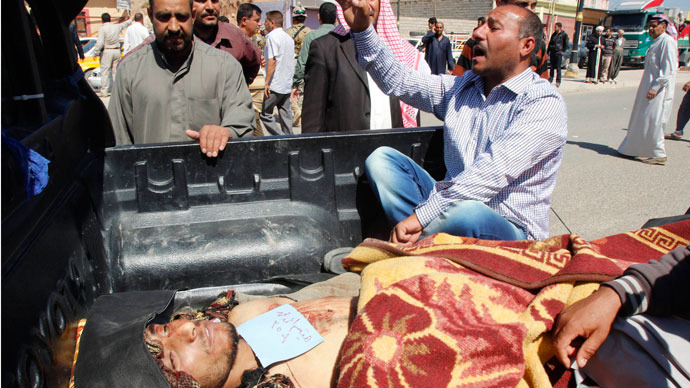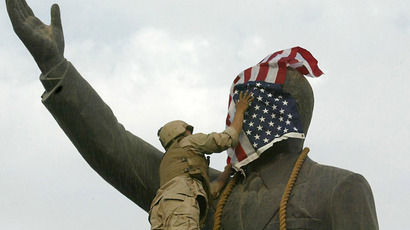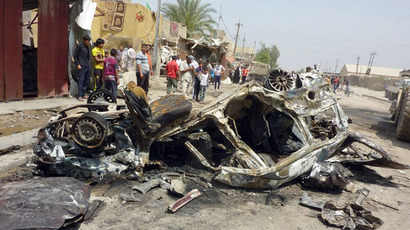Iraq clashes between army and Sunni tribesmen kill 169 in three days

Iraqi PM has warned the country about possible return of "sectarian civil war" after 169 have been killed in three days of violence across the ethnically divided state. Nearly 300 have been wounded.
In remarks broadcast on state TV, Prime Minister Nuri al-Maliki
called on ordinary Iraqis "to take the initiative, and not be
silent about those who want to take the country back to sectarian
civil war."
On Wednesday, clashes erupted in North of the country when
government forces clashed with Sunni protesters, following the
deaths of at least 56 people at a protest camp near Kirkuk on
Tuesday.
“It reflects ongoing sectarian violence that was released in
2003 when we removed Saddam Hussein,” professor Lawrence
Davidson, from Westchester University told RT.
The army raided the camp in Hawija, where Sunni Muslims have have
been gathering for month to protest what they see as their
marginalization under the Shia-led Maliki government.
Clashes followed and with them fears that ethnic violence could
spread and return as a critical internal security issue as it was
following the downfall of Saddam Hussein.
The military said the operation in Hawijah that sparked the
clashes was aimed at the Naqshbandiya Army, a band of Sunni
militants suspected to have infiltrated the ranks of the
anti-government protesters.
Two leaders of the Hawijah protest stated Thursday that in response
to Tuesday killings they would form a wing of the Naqshbandiya
Army.
"We in the Uprising of the Free People of Iraq announced our
full loyalty to the (Naqshbandiya Army), so we can be an armed wing
related to it, working on cleaning Iraq from Safavid [pejorative
word for Shiites, the majority of Iraqis] militias," AFP cited
a protest spokesman, Hamed al-Juburi.
"After they burned our tents and broke into our sit-in, we
decided to join the (Naqshbandiya Army) as a military wing,"
protest organiser Abdulmalik al-Juburi was also quoted as
saying.
On Wednesday, armed tribesmen cordoned the Sunni town of Qara
Tappah. Fierce clashes erupted when Iraqi troops arrived to try to
clear the makeshift roadblocks. Police say 15 gunmen and seven
soldiers were killed.
In the clashes, Sunni protesters took over an army base and torched
a Shia mosque in Sulaiman Pek before army helicopters were
deployed, resulting in the death of at least 18, including 10
protestors and five soldiers, officials announced. The fighters now
control the town after government forces withdrew from the area,
local administrative official responsible for the area told
AFP.
Roadside bombs and rocket-propelled grenades attacks on a military
convoy near Tikrit killed three more soldiers.
Furthermore, at least eight people were killed and 23 more injured from a car bomb explosion in Baghdad, according to the authorities.

Thousands of Sunnis have been protesting since December over what they see as an effort by Prime Minister Nouri al - Maliki to keep them out of top positions in the government. They have also protested against tough anti-terrorism laws that they says discriminates against their religion.
Under the legislature, government forces constantly carry out
arrests in Sunni areas on charges of terrorism and ties to the
deposed Baathist regime of Saddam Hussein.
Professor Davidson blames the US forces for unleashing the ethnic
unrest in the country.
“Since 2003, thousands, tens of thousands people have died as a
part of this sectarian violence. We (US) opened Pandora’s box and
we could not close it even when we were there,” he argues.
Prime Minister Maliki has offered some compromises to Sunni
leaders, even to amend the anti-terrorism laws, but most Sunni
tribal leaders say they will not be enough to appease their
followers.
“Maliki government’s reputation has already hit bottom. What we got
is a government that is determined to maintain its position and
crush opposition, particularly Sunni politicians,” Davidson
says.














